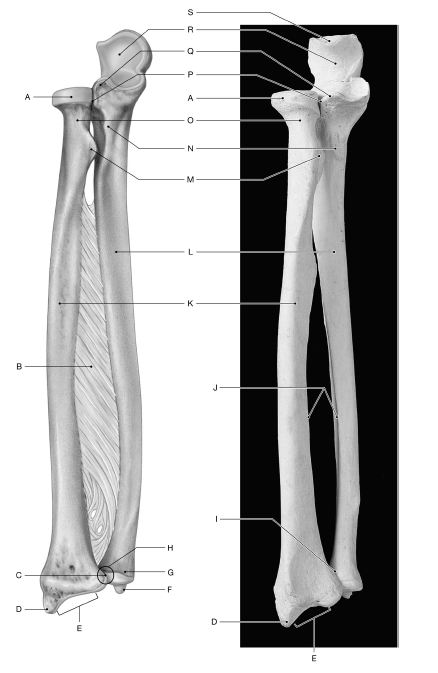Using the figure below, identify the labeled part.

1) Label A: ______________________________
2) Label B: ______________________________
3) Label C: ______________________________
4) Label D: ______________________________
5) Label E: ______________________________
6) Label F: ______________________________
7) Label G: ______________________________
8) Label H: ______________________________
9) Label I: ______________________________
10) Label J: ______________________________
11) Label K: ______________________________
12) Label L: ______________________________
13) Label M: ______________________________
14) Label N: ______________________________
15) Label O: ______________________________
16) Label P: ______________________________
17) Label Q: ______________________________
18) Label R: ______________________________
19) Label S: ______________________________
1) Head of radius
2) Interosseous membrane
3) Ulnar notch of radius
4) Radial styloid process
5) Carpal articular surface
6) Ulnar styloid process
7) Head of ulna
8) Distal radioulnar joint
9) Ulnar notch of radius
10) Attachment surfaces for interosseous membrane
11) Radius
12) Ulna
13) Radial tuberosity
14) Ulnar tuberosity
15) Neck of radius
16) Radial notch of ulna
17) Coronoid process
18) Trochlear notch
19) Olecranon
You might also like to view...
Perceptions are derived from higher-order processing of sensory information.
Answer the following statement true (T) or false (F)
Age, sex, hormone levels, and stress all influence basal metabolic rate.
Answer the following statement true (T) or false (F)
Which of the following is NOT a stage in the development of the central nervous system?
A) neural tube B) neural plate C) three-vesicle (three-pouch) brain D) four-vesicle (four-pouch) brain
Which of the following organic groups does an enzyme belong to?
A. nucleic acid B. lipid C. vitamin D. carbohydrate E. protein